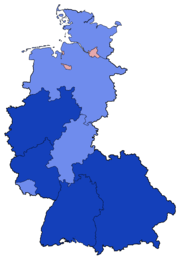German federal election, 1957
|
|
||||||||||||||||||||||||||||||||||||||||||||||||||||||||||||||||||||||||||||||||||||||
|
||||||||||||||||||||||||||||||||||||||||||||||||||||||||||||||||||||||||||||||||||||||
|
||||||||||||||||||||||||||||||||||||||||||||||||||||||||||||||||||||||||||||||||||||||
|
|
||||||||||||||||||||||||||||||||||||||||||||||||||||||||||||||||||||||||||||||||||||||
| Election results (party list) by state: the lighter blue denotes states where CDU had the plurality of votes; darker blue denotes states where CDU/CSU had the absolute majority of the votes; and pink denotes states where the SPD had the plurality of votes | ||||||||||||||||||||||||||||||||||||||||||||||||||||||||||||||||||||||||||||||||||||||
|
||||||||||||||||||||||||||||||||||||||||||||||||||||||||||||||||||||||||||||||||||||||
Federal elections were held in West Germany on 15 September 1957. The Christian Democratic Union and its longtime ally, the Christian Social Union in Bavaria, won a sweeping victory, taking 277 seats in the Bundestag to win the first--and to date, only--absolute majority for a single German parliamentary group in a free election.
Federal Chancellor Adenauer had some solid advantages over his Social Democratic opponent, Erich Ollenhauer: West Germany had become fully sovereign in 1955, it had joined the European Economic Community in March 1957, its economy grew steadily with a very low unemployment, and most West Germans felt clearly more prosperous and more secure than in 1949 or 1953. Although the West German economic growth was more directly enhanced by the social market economy policies of Economics Minister Ludwig Erhard, most non-socialistically inclined West German voters gave Adenauer the credit for it. The All-German Bloc lost all of their seats.
...
Wikipedia




